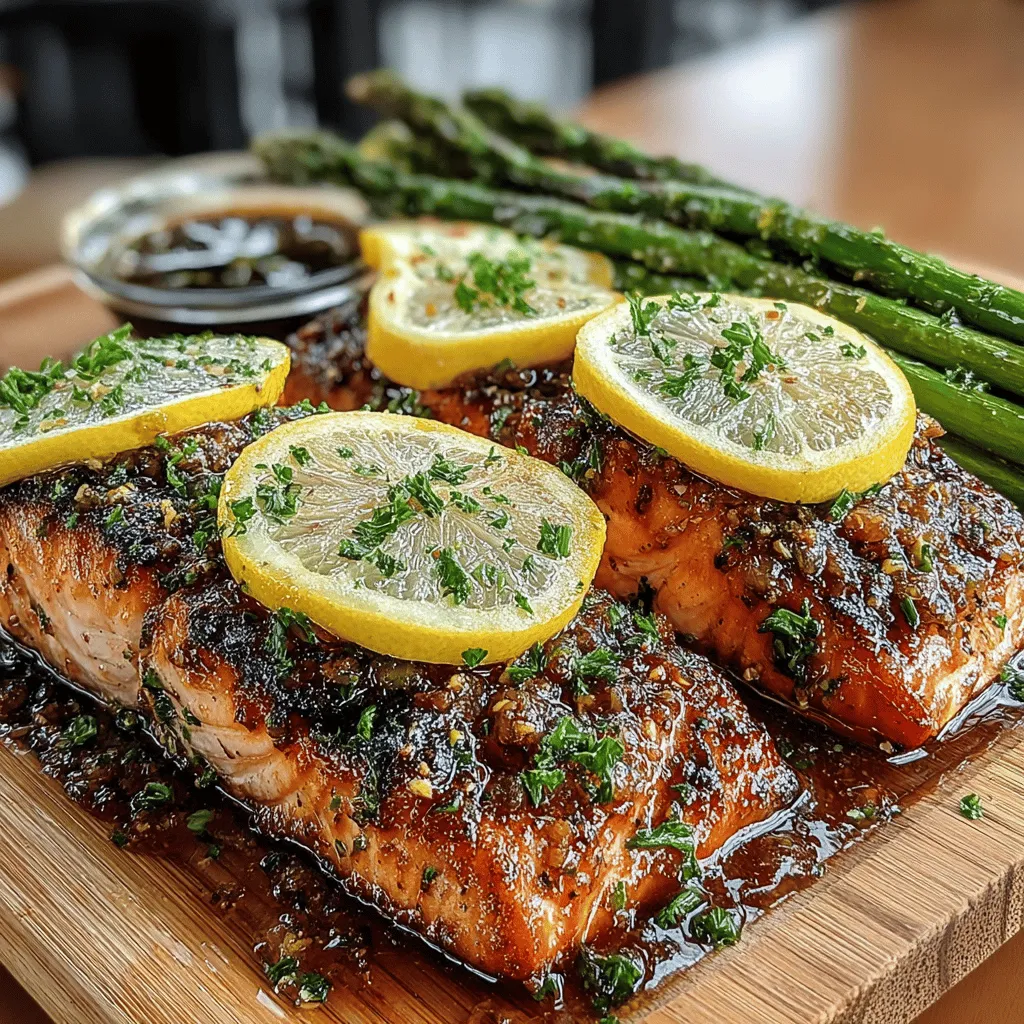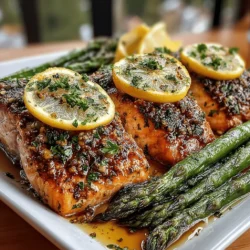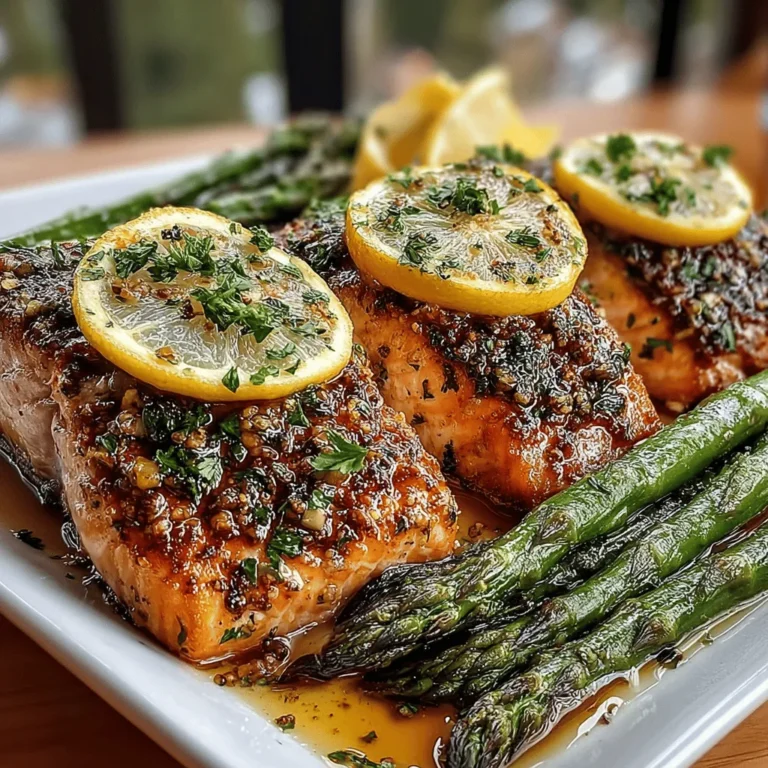Introduction
Highlighting the perfect balance of flavors and nutrition, Lemon Herb Grilled Salmon with Asparagus stands out as a delightful dish that can elevate any dining experience. This recipe combines the rich, buttery texture of salmon with the fresh, vibrant taste of herbs and the subtle crunch of grilled asparagus. Ideal for a summer barbecue or a cozy family dinner, this dish is not only easy to prepare but also packed with health benefits. In this article, we will explore the ingredients, preparation steps, and the nutritional advantages of this delicious meal, ensuring you can recreate it effortlessly in your own kitchen.
Ingredients
– 4 salmon fillets (6 ounces each)
– 1 pound of asparagus, trimmed
– 1/4 cup olive oil
– 2 tablespoons lemon juice
– Zest of 1 lemon
– 2 cloves garlic, minced
– 1 teaspoon dried oregano
– 1 teaspoon dried thyme
– 1 teaspoon dried rosemary
– Salt and pepper to taste
– Lemon wedges for serving (optional)
Instructions
1. In a small bowl, whisk together the olive oil, lemon juice, lemon zest, minced garlic, oregano, thyme, rosemary, salt, and pepper to create the marinade.
2. Place the salmon fillets in a shallow dish or a resealable plastic bag and pour the marinade over the top, ensuring each fillet is well coated. Cover or seal and refrigerate for at least 30 minutes, preferably up to 2 hours.
3. While the salmon is marinating, prepare the asparagus by rinsing it under cold water and trimming off the woody ends.
4. In a separate bowl, toss the asparagus with olive oil, salt, and pepper until evenly coated.
5. Preheat your grill to medium-high heat. Once hot, remove the salmon from the marinade and discard the remaining marinade.
6. Place the salmon fillets skin-side down on the grill, along with the asparagus. Grill the salmon for about 4-6 minutes per side, depending on thickness, and grill the asparagus for approximately 8-10 minutes, turning occasionally until tender and charred.
7. Once cooked, remove the salmon and asparagus from the grill and let them rest for a couple of minutes before serving. Optionally, serve with lemon wedges for an extra burst of flavor.
Understanding the Ingredients
Exploring Salmon
– Nutritional Benefits of Salmon: Salmon is rich in omega-3 fatty acids, which are essential for heart health and brain function. It is also an excellent source of high-quality protein, vitamins, and minerals like Vitamin D and selenium.
– Varieties of Salmon and Their Flavor Profiles: Common types of salmon include Atlantic, Chinook (King), Coho, and Sockeye. Each variety has a unique flavor and texture, with King salmon being the richest and most buttery, while Sockeye has a more robust flavor.
– Importance of Freshness in Selecting Salmon: When purchasing salmon, look for bright, moist fillets with a fresh, ocean-like smell. Avoid any fillets that appear dull or have a strong fishy odor.
The Role of Asparagus
– Nutritional Value of Asparagus: Asparagus is low in calories and high in fiber, vitamins A, C, E, and K, as well as folate. It also contains antioxidants that can help protect against chronic diseases.
– Seasonal Availability and Selection Tips: Asparagus is typically in season from late winter through spring. Look for firm, bright green stalks with closed tips; avoid any that are limp or have open tips.
– Cooking Techniques for Asparagus: Grilling, roasting, and steaming are popular methods for cooking asparagus. Each technique can bring out different flavors and textures, with grilling adding a delightful smoky char.
Herbs and Flavor Enhancers
– Overview of Dried Herbs: Dried herbs such as oregano, thyme, and rosemary add depth and flavor to dishes. They are a convenient way to enhance meals, especially when fresh herbs are not available.
– Health Benefits of Fresh Herbs: Fresh herbs not only elevate the flavor profile of dishes but also provide health benefits. They are often rich in antioxidants and can aid in digestion and inflammation.
– The Significance of Garlic in Flavoring: Garlic is a staple in many cuisines for its aromatic qualities and health benefits, including anti-inflammatory and antioxidant properties.
The Importance of Olive Oil and Lemon
– Health Benefits of Using Olive Oil: Olive oil is a healthy fat that is known to promote heart health. It is rich in monounsaturated fats and antioxidants, making it a staple in Mediterranean diets.
– Why Lemon Juice and Zest Enhance Flavor: Lemon juice and zest add brightness and acidity to dishes, helping to balance flavors and enhance the overall taste profile.
– Balancing Acidity in Dishes: Incorporating acidic components such as lemon juice can elevate the flavor of rich ingredients like salmon, making the dish more complex and enjoyable.
Preparation Steps
Marinating the Salmon
– Detailed Steps for Creating the Marinade: Combine olive oil, lemon juice, zest, garlic, and dried herbs in a bowl. Mix well to ensure all ingredients are incorporated.
– Importance of Marination Time for Flavor Infusion: Allowing the salmon to marinate for at least 30 minutes helps the flavors penetrate the fish, resulting in a more flavorful dish.
– Tips for Ensuring Even Coating of the Marinade: For even flavor distribution, ensure that the salmon is fully submerged in the marinade or turn the fillets periodically while marinating.
Preparing the Asparagus
– Techniques for Trimming and Cleaning Asparagus: Hold the asparagus stalk in both hands and bend until it snaps naturally to remove the woody end. Rinse under cold water to clean.
– Best Practices for Seasoning and Oiling: Toss the trimmed asparagus in a bowl with olive oil, salt, and pepper until fully coated, ensuring a delicious flavor when grilled.

Grilling Techniques
Preheating the Grill: Why It Matters
Preheating your grill is crucial for achieving that perfect sear on the salmon and ensuring even cooking. A properly preheated grill helps to lock in moisture and flavor, preventing the fish from sticking to the grates. Aim to preheat your grill to medium-high heat, around 375°F to 400°F, for optimal results.
Understanding Grill Temperatures
Different types of fish require different temperatures to cook properly. For salmon, a medium-high temperature is ideal, allowing the exterior to crisp up while keeping the interior moist and flaky. Use a grill thermometer to monitor the temperature accurately, ensuring that you maintain the right heat throughout the cooking process.
Tips for Grilling Salmon Perfectly
– Use skin-on fillets: The skin acts as a protective barrier that helps retain moisture.
– Oil the grill grates: This prevents sticking and allows for easy flipping.
– Don’t flip too soon: Allow the salmon to cook undisturbed for about 4-5 minutes before flipping to achieve a nice crust.
– Check for doneness: Salmon is done when it flakes easily with a fork and has reached an internal temperature of 145°F.
Cooking the Asparagus
Methods for Grilling Asparagus
Asparagus can be grilled directly on the grates or in a grilling basket. If grilling directly, ensure the spears are thick enough to avoid falling through. Tossing them in olive oil and seasoning before grilling enhances flavor and prevents them from drying out.
Timing and Temperature for Optimal Tenderness
Grill asparagus for about 5-7 minutes, turning occasionally. The key is to achieve a tender yet crisp texture. If grilling over medium-high heat, the asparagus will cook quickly, so keep an eye on them to prevent overcooking.
How to Achieve the Perfect Char
For that desirable char, consider placing the asparagus at an angle to the grates. This not only creates attractive grill marks but also allows for even cooking. A sprinkle of salt and pepper before grilling can enhance the natural flavors.
Serving Suggestions
Plating the Dish
Presentation is key to a memorable dining experience. Start by layering the grilled salmon on one side of the plate, with the asparagus arranged alongside. This creates a balanced look that is both appetizing and visually appealing.
Garnishing with Lemon Slices and Parsley
A simple garnish can elevate the dish. Add fresh lemon slices on top of the salmon and sprinkle with chopped parsley for a pop of color and freshness. This not only enhances the visual appeal but also complements the flavors of the dish.
Suggestions for Side Dishes that Complement the Meal
Consider serving a light quinoa salad or a simple mixed greens salad with a vinaigrette to balance the richness of the salmon. Roasted potatoes or a citrus-infused rice pilaf can also provide a satisfying accompaniment.
Pairing Wine with Salmon
Recommendations for White Wines that Pair Well with Grilled Salmon
When it comes to wine pairing, a crisp white wine can enhance the flavors of grilled salmon. Consider a Sauvignon Blanc, which offers bright acidity and citrus notes, or a Chardonnay, known for its buttery texture and oak undertones. Both options complement the dish beautifully.
Overview of Flavor Profiles and How They Enhance the Dish
Sauvignon Blanc’s vibrant acidity cuts through the richness of the salmon, while Chardonnay’s creamy notes complement the lemon herb seasoning. Selecting a wine that mirrors the dish’s flavor profile can elevate the dining experience significantly.
Nutritional Benefits of Lemon Herb Grilled Salmon with Asparagus
Health Benefits of Salmon
Salmon is a nutritional powerhouse, rich in omega-3 fatty acids, which are beneficial for heart health. These healthy fats can help reduce inflammation, lower blood pressure, and improve overall cardiovascular function. Additionally, salmon is an excellent source of high-quality protein, crucial for muscle maintenance and repair.
Asparagus as a Superfood
Asparagus is often hailed as a superfood due to its rich antioxidant content, which helps combat oxidative stress and inflammation in the body. It is also high in dietary fiber, aiding in digestion and promoting a healthy gut.
The Role of Herbs in Health
Herbs not only enhance the flavor of dishes but also contribute to overall wellness. Garlic, commonly used in herb blends, has anti-inflammatory properties and can support immune function. Fresh herbs like parsley and dill add nutrients while brightening the dish’s taste.
Conclusion
Lemon Herb Grilled Salmon with Asparagus is more than just a meal; it embodies a blend of flavors and health benefits that can satisfy both the palate and the body. With simple yet effective preparation methods, this dish is accessible for cooks of all skill levels. By understanding the ingredients and their nutritional profiles, you can appreciate not only the taste but also the health advantages of this delicious recipe. Whether you’re cooking for yourself or hosting a gathering, this dish is sure to impress and nourish, making it a perfect addition to your culinary repertoire.


